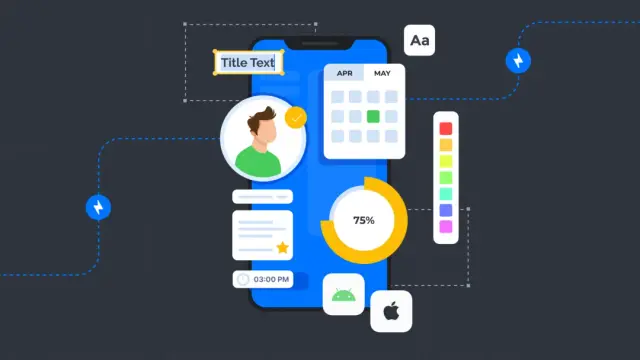How No-Code Platforms Leverage REST APIs
Discover how no-code platforms leverage REST APIs to facilitate seamless integration, improve data management, and extend business capabilities with minimum effort.

Understanding REST APIs
REST APIs (Representational State Transfer Application Programming Interfaces) are an important part of modern software architecture, allowing for communication and data exchange between different components of software systems. They enable applications to interact with each other using web services and a common set of HTTP methods, such as GET, POST, PUT, PATCH, and DELETE. The central concept of REST is the resource, which can be a web document, an object, or any other entity accessible on the internet. URLs identify resources, and their representations can be in any format, such as JSON or XML. The following key characteristics define REST APIs:
- Stateless: REST APIs are stateless, meaning that each request from a client to a server must contain all information needed to process it. This enables applications to be more scalable and maintainable, as the server doesn't need to keep track of its clients' state.
- Cacheable: Responses can be cached on the client-side, reducing the load on the server and improving performance.
- Client-Server Architecture: Clients and servers have separate responsibilities, making it easier to scale, maintain, and evolve each side independently.
- Layered System: REST APIs can be organized in a layered system, enabling separation of concerns and making it easier to build, maintain, and evolve complex applications.
The Role of REST APIs in No-Code Platforms
No-code platforms have revolutionized the way applications are built by simplifying the development process and empowering non-technical users to create complex and feature-rich applications without writing any code. One of the key enablers of this revolution is the integration of REST APIs into no-code platforms. REST APIs play an important role in no-code platforms by enabling seamless integration of external systems, automating tasks, managing data, and extending the platform's capabilities. By leveraging existing APIs, no-code platforms can save significant development time and efforts, eliminate the need for additional coding, and improve the functionality of the applications created on these platforms. Here are some essential ways no-code platforms utilize REST APIs:
- Data Management: REST APIs enable no-code platforms to access and manipulate data from various databases, third-party systems, or web services. This streamlines data-fetching, categorization, and synchronization tasks for non-technical users.
- Automation: By integrating APIs, no-code platforms can automate tasks like sending emails, managing user accounts, or processing payments, without the need for custom scripting.
- Customization: No-code platforms support custom REST APIs, allowing users to build their applications tailored to their specific use cases and extending the platform's existing functionality.
- Scalability and performance: API integration in no-code platforms ensures applications can scale with increasing data volume and user base by offloading processing tasks to the API server.

Benefits of Leveraging REST APIs with No-Code Platforms
Integrating REST APIs with no-code platforms has numerous advantages, empowering businesses to create powerful and flexible applications tailored to their needs. Combining REST APIs and no-code platforms enables businesses to streamline operations, minimize development hurdles, and efficiently respond to changing market needs. Here are some key benefits:
- Seamless Data Exchange: REST APIs enable no-code platforms to interact with various external systems, ensuring smooth data exchange between applications, databases, and web services. This interoperability simplifies data management tasks and ensures application consistency.
- Improved Functionality: By integrating existing APIs, no-code platforms can offer various functionalities such as authentication, payment processing, email delivery, and more. This reduces development time and provides flexibility in choosing the most suitable solutions for the application's requirements.
- Reduced Development Time: Leveraging REST APIs eliminates the need to write custom code for complex tasks, resulting in a significantly shorter development cycle. This enables businesses to bring their applications to market faster, providing a competitive edge.
- Enhanced Security: Many REST APIs have built-in security measures like encryption, authentication, and authorization, protecting sensitive data and preventing unauthorized access to application resources.
- Scalability: REST APIs integrated into a no-code platform allow applications to handle increased traffic and data volume, providing optimal performance even as the businesses grow.
- Easy Maintenance: Applications that use REST APIs are easier to update and maintain because they rely on standardized methods and protocols. Moreover, many APIs include comprehensive documentation, providing clear guidance for integrating and managing them within the no-code platforms.
Leveraging REST APIs in no-code platforms offers a powerful combination of flexibility, ease of use, and scalability, making it an excellent choice for businesses looking to quickly build feature-rich and adaptable applications. By integrating APIs, businesses can stay agile and responsive to market changes, streamline their operations, and ensure the long-term success of their applications.
AppMaster: A No-Code Platform that Maximizes REST API Capabilities
AppMaster is a powerful no-code platform that streamlines the development process of backend, web, and mobile applications. It eliminates technical debt by removing complex, time-consuming coding and allowing users to visually create data models, business logic, REST API, and WebSocket endpoints. By leveraging REST APIs, AppMaster users can seamlessly integrate with external systems, automate tasks, and extend the platform's capabilities to meet the ever-evolving needs of their businesses.
AppMaster provides an intuitive, drag-and-drop UI that enables users to create interactive applications without writing code. Its Backend BP Designer supports the creation of business logic, while the Web and Mobile BP Designers allow users to build the frontend components to create fully functional web applications and native mobile applications. With the vast array of REST API endpoints AppMaster generates, businesses can accomplish better data management, quicker automation, and easy integration with third-party services.
The AppMaster no-code platform has been recognized as a High Performer by G2 in various categories, including No-code Development Platforms, Rapid Application Development (RAD), API Management, Drag&Drop App Builders, API Design, and Application Development Platforms. As a Momentum Leader in No-Code Development Platforms, AppMaster is revolutionizing the way businesses build powerful, scalable applications.
How to Integrate REST APIs in AppMaster
Integrating REST APIs in AppMaster is a straightforward process. Follow these guidelines to implement REST API integration within your applications:
- Understand the API: Familiarize yourself with the REST API you want to integrate. Understand its methods, parameters, authentication, and usage restrictions. This will help you design a seamless integration process for your application.
- Create an API Building Block: Start by configuring API as a component or a reusable building block using AppMaster functionality. Embed the API within your application logic by adding the necessary parameters, API keys, or authentication credentials.
- Design Business Logic: Use the Visual BP Designer in AppMaster to create your application's business logic. This graphical interface allows you to visually integrate your REST API into the application while taking advantage of AppMaster capabilities, like data models, business processes, and endpoints.
- Apply REST API Methods: Use the HTTP methods, such as GET, POST, PUT, PATCH, and DELETE, provided by the REST API, to interact with external systems and perform various tasks. Ensure that the implemented methods meet your business requirements and utilize endpoint customization for optimum results.
- Test Your Integration: Thoroughly test your REST API integration within your AppMaster application. Ensure that the APIs function correctly and the data exchange is seamless between the services and applications involved.
- Monitor and Optimize: As your application grows, always monitor the performance of the integrated REST APIs. Keep track of the API changes and version releases and adjust your integration accordingly to avoid disruptions.
By following these steps, you can efficiently integrate and manage REST APIs within your AppMaster applications and capitalize on the platform's extensive capabilities.
Best Practices for No-Code Platforms and REST APIs
Adhering to best practices for working with no-code platforms and REST APIs ensures optimal application performance and compatibility. Adopt the following best practices:
- Select the Right APIs: Choose well-documented, reliable, and secure APIs to integrate with your no-code platform. Assess the API's response time, compatibility with your application, and the availability of support resources to make an informed decision.
- Document and Understand the API: Thoroughly familiarize yourself with the REST API before implementing it in your no-code platform. Understand the required parameters, methods, and response structures to ensure proper communication between different software systems.
- Secure Your API Integration: Implement security best practices for your API integration, such as proper authentication, access control, encryption, and token management. This will help safeguard your application and avoid unauthorized access to sensitive information.
- Monitor API Performance: Keep track of the performance of your integrated REST APIs, be proactive in solving performance or availability issues, and document any changes required for your application. This measure will ensure the continuous smooth functioning of your no-code application.
- Utilize API Versioning: Use the API versioning to stay up-to-date with the latest enhancements and features. Ensure backward compatibility and migration support to accommodate future API changes without disrupting your application workflow.
By following these best practices, you can leverage the full potential of REST APIs in your no-code platform, improve application performance, and streamline your business processes. No-code platforms like AppMaster offer a comprehensive and accessible solution for businesses to create dynamic, scalable, and secure applications that can evolve with their ever-changing requirements. By harnessing the power of REST APIs, no-code application development becomes a seamless and efficient process that empowers businesses to excel in the digital era.
FAQ
REST APIs (Representational State Transfer Application Programming Interfaces) are a standardized architecture that allows communication and data exchange between different software systems. They enable various applications to interact with each other using web services and a common set of HTTP methods, such as GET, POST, PUT, PATCH, and DELETE.
No-code platforms use REST APIs to integrate with external systems, access data, automate tasks, and extend the platform's capabilities. By leveraging existing APIs, no-code platforms can significantly reduce development time, enable seamless data exchange, and improve functionality without requiring additional coding.
Integrating REST APIs with no-code platforms offers numerous benefits, such as seamless data exchange, improved functionality, reduced development time, increased security, and enhanced scalability. This enables businesses to adapt more quickly to changing requirements, improve process efficiency, and streamline application development.
AppMaster, a powerful no-code platform, allows users to create business logic and REST API endpoints using visual BP Designer. With the intuitive interface and drag-and-drop feature, users can integrate REST APIs with their applications, automate tasks, manage data, and extend the functionality without writing any code.
Yes, AppMaster allows users to integrate custom REST APIs, converting them into reusable building blocks for efficient application development and data management. By integrating custom APIs, you can extend your application's capabilities, automate tasks, and improve data exchange.
When working with no-code platforms and REST APIs, adhere to best practices like choosing the right APIs, understanding and documenting the API, securing your API integration, monitoring API performance, and utilizing API versioning to ensure the best application performance possible.
Yes, no-code platforms like AppMaster are designed for users with no programming experience. The visual interface and drag-and-drop features simplify the development process. Even users with no programming background can build complex applications that leverage REST APIs without needing extensive technical knowledge.
AppMaster provides robust security features to protect your API integrations, including role-based access control, transport layer security (TLS), encryption, and data protection. The platform also generates Go (golang) code for backend applications, known for its high performance and security.
While REST APIs are widely used in no-code platforms, some platforms may also support other API types, such as SOAP or GraphQL. However, REST APIs remain the popular choice because of their simplicity and ease of use.
Yes, with the Enterprise subscription plan, AppMaster allows users to export their application's source code, offering complete control over the applications and the opportunity to host them on-premises if desired. Alternatively, you can export binary files with the Business or Business+ subscription plans.






